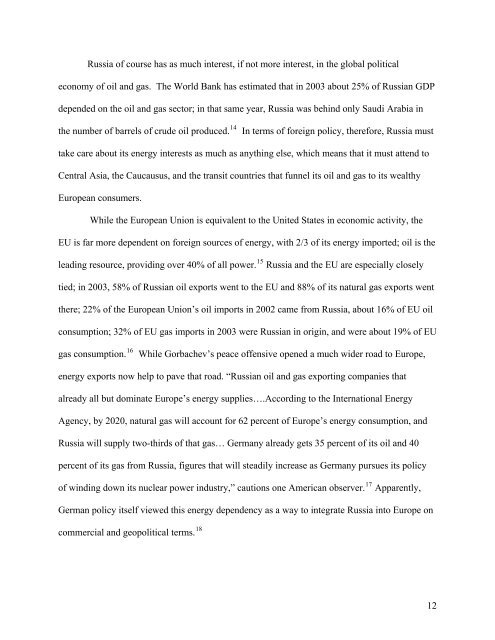from transition to hegemony - The Watson Institute for International ...
from transition to hegemony - The Watson Institute for International ...
from transition to hegemony - The Watson Institute for International ...
Create successful ePaper yourself
Turn your PDF publications into a flip-book with our unique Google optimized e-Paper software.
Russia of course has as much interest, if not more interest, in the global political<br />
economy of oil and gas. <strong>The</strong> World Bank has estimated that in 2003 about 25% of Russian GDP<br />
depended on the oil and gas sec<strong>to</strong>r; in that same year, Russia was behind only Saudi Arabia in<br />
the number of barrels of crude oil produced. 14<br />
In terms of <strong>for</strong>eign policy, there<strong>for</strong>e, Russia must<br />
take care about its energy interests as much as anything else, which means that it must attend <strong>to</strong><br />
Central Asia, the Caucausus, and the transit countries that funnel its oil and gas <strong>to</strong> its wealthy<br />
European consumers.<br />
While the European Union is equivalent <strong>to</strong> the United States in economic activity, the<br />
EU is far more dependent on <strong>for</strong>eign sources of energy, with 2/3 of its energy imported; oil is the<br />
leading resource, providing over 40% of all power. 15 Russia and the EU are especially closely<br />
tied; in 2003, 58% of Russian oil exports went <strong>to</strong> the EU and 88% of its natural gas exports went<br />
there; 22% of the European Union’s oil imports in 2002 came <strong>from</strong> Russia, about 16% of EU oil<br />
consumption; 32% of EU gas imports in 2003 were Russian in origin, and were about 19% of EU<br />
gas consumption. 16<br />
While Gorbachev’s peace offensive opened a much wider road <strong>to</strong> Europe,<br />
energy exports now help <strong>to</strong> pave that road. “Russian oil and gas exporting companies that<br />
already all but dominate Europe’s energy supplies….According <strong>to</strong> the <strong>International</strong> Energy<br />
Agency, by 2020, natural gas will account <strong>for</strong> 62 percent of Europe’s energy consumption, and<br />
Russia will supply two-thirds of that gas… Germany already gets 35 percent of its oil and 40<br />
percent of its gas <strong>from</strong> Russia, figures that will steadily increase as Germany pursues its policy<br />
of winding down its nuclear power industry,” cautions one American observer. 17 Apparently,<br />
German policy itself viewed this energy dependency as a way <strong>to</strong> integrate Russia in<strong>to</strong> Europe on<br />
commercial and geopolitical terms. 18 12
















